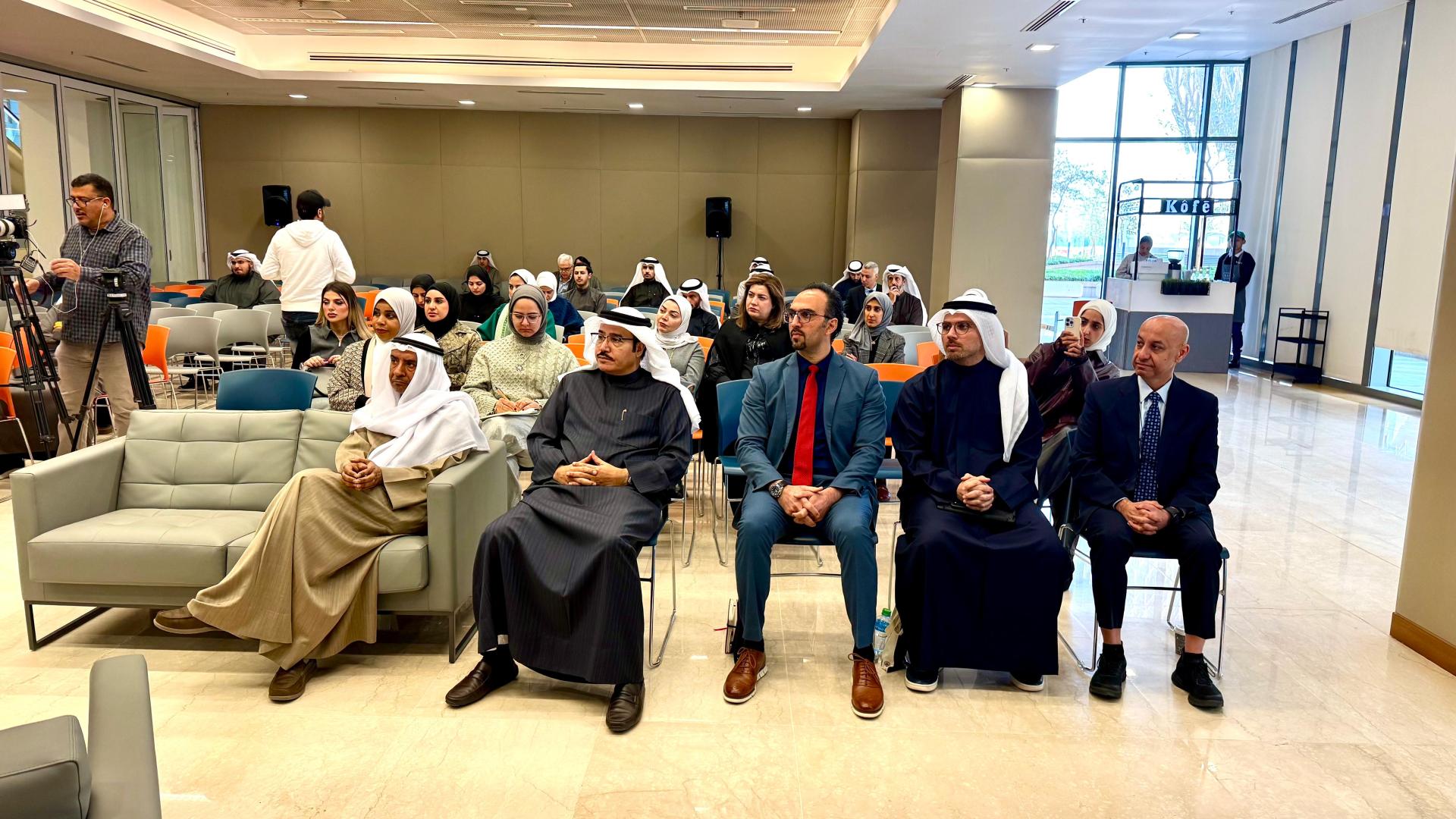
In line with the collaboration between state institutions to empower national talents and contribute to supporting sustainable development plans, Kuwait University, represented by the Office of the Vice President for Planning and the Office of Entrepreneurship and Innovation at the College of Business Administration, organized a platform for Kafu to discuss the Nudge Theory during various discussion sessions. The event took place on Monday, February 10, 2025, at the College of Business Administration in Sabah Al-Salem University City.
The event was attended by Dr. Osama Al-Omair, Acting Vice President for Planning, along with Dr. Bibi Al-Ajmi, Acting Assistant Vice President for Institutional Development, Dr. Yusuf Al-Ibrahim, faculty member in the Department of Economics at the College of Administrative Sciences and Chairman of the Kafu Board of Trustees, Dr. Fatima Al-Mousawi, CEO of the Kafu platform, Dr. Mashari Al-Nahidh, faculty member in the Department of Management and Marketing at the College of Administrative Sciences, Dr. Sarah Khalaf, faculty member in the Department of Finance and Financial Institutions, engineer Sharifa Al-Shalfan, Municipal Council Member, Mr.Fahad Al-Sharikh, a technology and finance expert in the Middle East and the United States, and several faculty members from Kuwait University as well as Kafu’s Board of Trustees.
The aim of the event was to open new avenues of knowledge and to explore innovative behavioral applications in decision-making and their impact on finance, health, and society.
Dr. Bibi Al-Ajmi, Acting Assistant Vice President for Institutional Development, expressed her happiness at attending the event, which lasted for three days. The event targeted faculty members and students at Kuwait University and focused on using innovative behavioral applications in making important decisions, which have clear relevance in institutional preparedness.
Dr. Yusuf Al-Ibrahim, faculty member in the Department of Economics at the College of Administrative Sciences and Chairman of Kafu's Board of Trustees, emphasized that the event aimed to explore the role of behavioral science in improving decision-making across three main areas and its positive impact on social decisions and the decision-making process. He mentioned that one of the key challenges facing emerging national competencies in the world of finance and business lies in behavioral and economic practices and how economic changes influence individual and societal spending behaviors. He explained that the application of Nudge Theory helps facilitate making better financial decisions.
Dr. Fatima Al-Mousawi, CEO of Kafu, shared that this year, the platform focuses on behavioral applications in key sectors, including health, finance, and society. Additionally, Nudge Theory applications in decision-making processes are used to build a cooperative society that actively and sustainably contributes to achieving national visions, ultimately aiming to create positive societal change by empowering individuals and communities to make choices that lead to a better future in support of Kuwait Vision 2035.
The forum also featured several members of Kafu's Board of Trustees, including the founder of the "Li wa Lakum" initiative and behavioral science expert, Ms. Taiba Al-Humaidhi, who shared her experience in studying behavioral science applications in financial areas and decision-making processes to enhance organizational performance. Dr. Mashari Al-Nahidh, Assistant Professor in Strategy and Entrepreneurship at the College of Administrative Sciences, presented the main theoretical applications of Nudge Theory in decision-making to achieve national visions.
In the health field, Dr. Ahmed Al-Sari, Associate Professor at Kuwait University and specialist in genetics and behavioral sciences at the Faculty of Medicine, along with clinical nutritionist and CEO of Nutribox platform, Ms. Nora Al-Askar, discussed key strategies in promoting healthy lifestyles, not just individually but also at the community level, by modifying behavioral patterns and dietary habits to bring about positive change.
At the conclusion of the discussion session, Dr. Yusuf Al-Ibrahim, Municipal Council Member Engineer Sharifa Al-Shalfan, technology and finance expert Fahad Al-Sharikh, and Dr. Sarah Khalaf, faculty member in the Department of Finance and Financial Institutions, discussed the main social and professional challenges hindering the modification and correction of individual and social behaviors and how to overcome them by applying Nudge Theory to create a more inclusive and flexible society for achieving sustainable goals.


 Colored
Colored Grayscale
Grayscale

